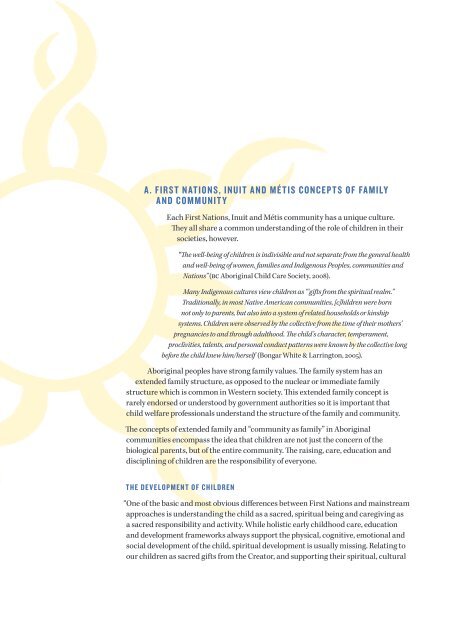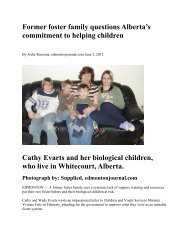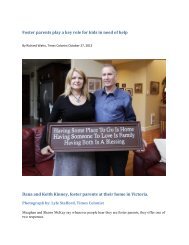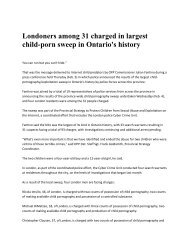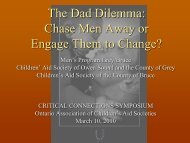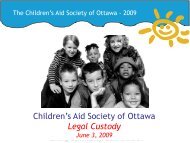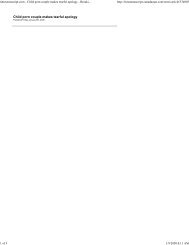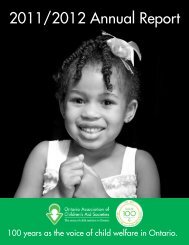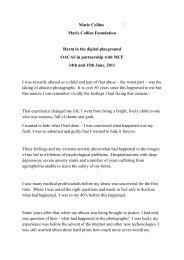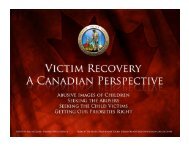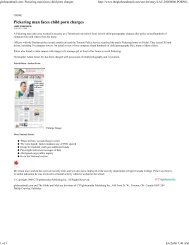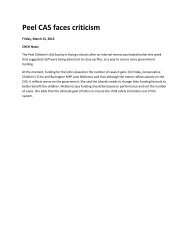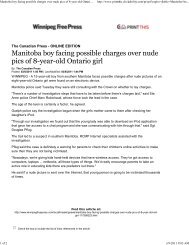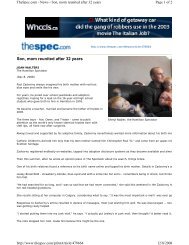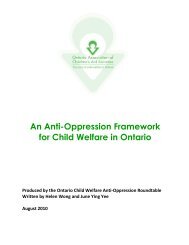English - Ontario Association of Children's Aid Societies
English - Ontario Association of Children's Aid Societies
English - Ontario Association of Children's Aid Societies
You also want an ePaper? Increase the reach of your titles
YUMPU automatically turns print PDFs into web optimized ePapers that Google loves.
A. FIRST NATIONS, INUIT AND MÉTIS CONCEPTS OF FAMILY<br />
AND COMMUNITY<br />
Each First Nations, Inuit and Métis community has a unique culture.<br />
They all share a common understanding <strong>of</strong> the role <strong>of</strong> children in their<br />
societies, however.<br />
“The well-being <strong>of</strong> children is indivisible and not separate from the general health<br />
and well-being <strong>of</strong> women, families and Indigenous Peoples, communities and<br />
Nations” (BC Aboriginal Child Care Society, 2008).<br />
Many Indigenous cultures view children as “‘gifts from the spiritual realm.”<br />
Traditionally, in most Native American communities, [c]hildren were born<br />
not only to parents, but also into a system <strong>of</strong> related households or kinship<br />
systems. Children were observed by the collective from the time <strong>of</strong> their mothers’<br />
pregnancies to and through adulthood. The child’s character, temperament,<br />
proclivities, talents, and personal conduct patterns were known by the collective long<br />
before the child knew him/herself (Bongar White & Larrington, 2005).<br />
Aboriginal peoples have strong family values. The family system has an<br />
extended family structure, as opposed to the nuclear or immediate family<br />
structure which is common in Western society. This extended family concept is<br />
rarely endorsed or understood by government authorities so it is important that<br />
child welfare pr<strong>of</strong>essionals understand the structure <strong>of</strong> the family and community.<br />
The concepts <strong>of</strong> extended family and “community as family” in Aboriginal<br />
communities encompass the idea that children are not just the concern <strong>of</strong> the<br />
biological parents, but <strong>of</strong> the entire community. The raising, care, education and<br />
disciplining <strong>of</strong> children are the responsibility <strong>of</strong> everyone.<br />
THE DEVELOPMENT OF CHILDREN<br />
“One <strong>of</strong> the basic and most obvious differences between First Nations and mainstream<br />
approaches is understanding the child as a sacred, spiritual being and caregiving as<br />
a sacred responsibility and activity. While holistic early childhood care, education<br />
and development frameworks always support the physical, cognitive, emotional and<br />
social development <strong>of</strong> the child, spiritual development is usually missing. Relating to<br />
our children as sacred gifts from the Creator, and supporting their spiritual, cultural


